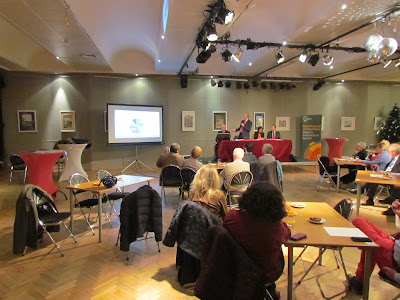RSC Belgium members and friends were treated to an excellent overview of the European Union's Copernicus programme on Valentine’s Day at the British School of Brussels. On the evening of Tuesday 14 February Dr Peter Breger talked to an enthusiastic crowd about Europe's Earth Observation system and its Sentinel satellites. The talk was fascinating and illustrated with many impressive images of the Earth.
Few people are aware of the wealth of data and insights provided by Earth observation satellites. Fewer still know how successful Europe has been in realising the most ambitious Earth observation programme yet: Copernicus.
In a personal view, Dr. Peter Breger (above) presented the progress made over the last decade, gave a brief overview of the satellites flying, what they measure and what information they already make available to all of us on a daily basis, for free.
Public services
Peter gave examples of the various public services Copernicus provide covering will be shown. Supporting emergency response during natural catastrophes has been one of the early success stories. The programme also tracks land use and its changes, which aids better management of our environment. Together with its forecasts of air quality and ocean dynamics it can inform us of impending pollution events, and support marine and maritime applications. He also briefly alluded to the non-public defence and security role of Copernicus.
Copernicus' latest addition - a climate change service - compiles projections of climate change and their impacts on environment and thus on economic activities. For an example consider the map below that shows the potential for wine making in the UK in 20250!
Peter certainly showed how the service provides a mass of authoritative data, of particular significance and importance in this current era that seems to be beset by 'post truth' and 'alternative facts'.
Wealth of links
If you want to know more about the Copernicus programme and how to access its wealth of data see the links below that Peter has provided. And you can download Peter's presentation here (7.2 MB file).
Copernicus
The main website is at www.copernicus.eu and you can follow the programme on Twitter: @CopernicusEU and Facebook Copernicus EU too
All the Copernicus services links can be found here: http://copernicus.eu/main/services
or individually at:
or individually at:
Marine: http://marine.copernicus.eu/
Atmosphere: http://atmosphere.copernicus.eu/
Emergency: http://emergency.copernicus.eu/
Climate: http://climate.copernicus.eu/
Sentinel satellites descriptions
https://sentinel.esa.int/web/sentinel/missions/sentinel-1
https://sentinel.esa.int/web/sentinel/missions/sentinel-2
https://sentinel.esa.int/web/sentinel/missions/sentinel-3
https://sentinel.esa.int/web/sentinel/missions/sentinel-4
https://sentinel.esa.int/web/sentinel/missions/sentinel-5
Other Space documents
The European Union's Space Strategy for Europe
(2016) http://ec.europa.eu/news/2016/10/20161026_en.htm
The Committee on Earth Observation Satellites (CEOS) database of satellites:
http://database.eohandbook.com/
First photo from space:
http://www.airspacemag.com/space/the-first-photo-from-space-13721411
iPhone app - Where are our Sentinel satellites?
https://itunes.apple.com/us/app/esa-sentinel/id1036738151?mt=8
Ocean modelling and satellite observations by EUMETSAT
https://www.futurelearn.com/courses/oceans-from-space
https://www.futurelearn.com/courses/oceans-from-space
Other links of interest
Baltic Algal bloom and nutrient circulation
http://www.uhrwerk-ozean.de/expedition/zeppelin/index.html.en
http://www.uhrwerk-ozean.de/expedition/zeppelin/index.html.en
Air quality forecasts
Interesting apps on air quality
http://www.airtext.info/
https://plumelabs.com/en/
http://www.pigeonairpatrol.com/
http://www.airtext.info/
https://plumelabs.com/en/
http://www.pigeonairpatrol.com/
Climate
change service – proof of concept tools for exploring ideas
http://swicca.climate.copernicus.eu/
http://swicca.climate.copernicus.eu/





